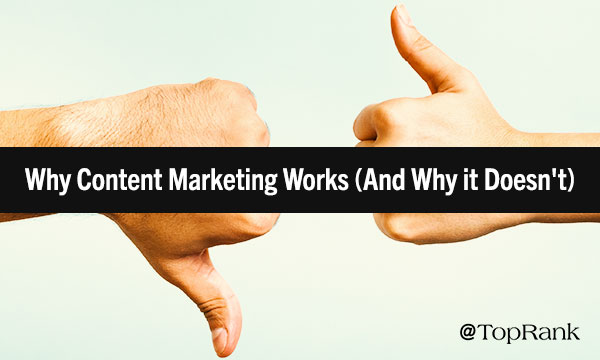Author: Anne Leuman / Source: Online Marketing Blog – TopRank®

90% of B2B Marketers say they’re using it to reach their larger business goals, according to the Content Marketing Institute’s 2018 B2B Content Marketing Report. However, just 24% of B2B marketers rate their content marketing as extremely or very successful.
Why is content marketing working extremely well for some marketers, but not for others? What makes content marketing so effective, and what holds (your content marketing efforts) back?
Well, let’s talk all about it. Content is at the center of everything we do here at TopRank Marketing. And below we dive into some of the key reasons why content marketing efforts succeed or fall short. Hopefully, this insight can help you level up your own content marketing strategy in a way that amplifies your results.
5 Reasons Why Content Marketing Works
#1 – You’re solving a problem.
While this is a fundamental marketing concept, it needs mentioning. Simply put, content marketing works when you’re able to create and deliver content that solves a specific, relevant problem for your audience.
Buyers are increasingly self-directed in their research and purchasing decisions, taking their questions to search engines to find answers. That’s why it’s no surprise that many searches start with question words like how, what, where, when, and why. Your audience is looking for content that can provide them with the best answer, tutorial, guide, checklist, or another resource that can help solve their problems.
So, when your content delivers exactly what your audience is looking for and where they’re looking for it, you can gain traffic, foster engagement, and nurture them to action.
Simply put, #ContentMarketing works when you’re able to create and deliver content that solves a specific, relevant problem for your audience. – @aleuman4 Click To Tweet
#2 – You’re targeting your ideal audience.
Successful marketing is rooted in being able to deliver the right message to the right person at the right time and on the right platform. The “spray and pray” method, where you’re blasting out content and hoping that your message sticks, can’t help you do this. But when done right, content marketing allows brands to target specific buyer personas and reach their ideal audience.
When content is personalized to address buyer pain points and common questions, you can capture more qualified traffic and leads, which increases the overall value of your content marketing efforts. In our experience, successful content marketers start by defining buyer personas, identifying their relevant pain points, and mapping them to content they might find helpful based on SEO opportunities and where they are in the sales funnel (e.g. checklists, definitions, infographics, etc.).

#3 – When you leverage customer data and insights.
We live in the age of big data. Every marketer has data. Every marketer knows data holds power. And the most forward-thinking marketers are leveraging data and their practical knowledge to draw insights that can be acted upon in their marketing strategy.
With data pouring into services like Google Analytics, you can see where your audience is dropping off, how they spend their time on your site, or what content has the best conversion rate. In addition, there are many public, third-party data providers that can be paired with your own data to gain more insight. Armed with this information, you can optimize your content marketing strategy based on your analysis to generate better results.
#4 – You’re climbing the rankings.
We all know that search engines help audiences find content. But without content, a brand has little SEO value.
As a result, successful content marketers don’t rely only on their brand’s main website pages to draw in organic…
Peter Bordes Jr
Founder & Managing Partner Trajectory Ventures. Lifetime entrepreneur, CEO, Board Member, mentor, advisor and investor.
Obsessed with the infinite realm of possibility in disruptive innovation driving global digital transformation in technology, cloud-based infrastructure, artificial intelligence, data, DevOps, fintech, robotics, aerospace, blockchain and digital media and advertising.

